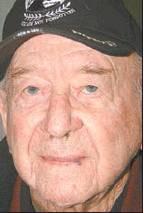
John Dabney Brown
World War II vet, former mayor dies
One of Holly Springs’ most celebrated World War II veterans and prisoners of war died December 23.
John Dabney Brown, 99, spent his last days at Christopher’s Personal Care Home in Holly Springs.
After the British military liberated his prison camp, Brown returned home and purchased Booker Hardware in the late 1940s, according to Ray Gallagher of Waterford.
He sold firearms, had a gas tank out front and a bulk tank in the rear of Booker’s for kerosene, Gallagher said.
Brown’s B-24 was shot down over Germany where he was taken prisoner.
“He bought Booker’s and did well,” Gallagher said.
They bird hunted together at times.
“I was talking to John Dabney one day about bird hunting,” Gallagher said. “He liked to hunt and my wife put sausage and biscuits, a small bottle of water and cornbread in our lunch.
“John Dabney said he found out during the war that you didn’t really have to have lunch. I’ll never forget that,” Gallagher said.
Brown sought out no special recognition for his POW status. But he did give The South Reporter a few interviews in the past few years.
Brown parachuted to safety, was captured and weighed 72 pounds when he was liberated by the British.
He rarely shared photos of himself coming home, a six-foot, two-inch survivor.
Brown said he parachuted out of his plane at 30,000 feet, landed, and walked a hundred feet or more before he was met by two Germans with double-barrel shotguns. They took him to jail and he served in a POW camp for one and a half years before the war ended.
When the restoration of the historic police station and Power House on East Falconer Avenue began, Brown recalled some of its uses and more of his life after the war.
He served as alderman and mayor of Holly Springs for a combined 32 years - as mayor from 1985 to 1989 and alderman-at-large before he became the mayor.
He also served as fire chief at times, rotating with Bobby Fant, and as interim police chief and manager of the Utility Department.
The Power House was built to serve as an electricity generating plant, providing the first electric supply to city homes, businesses, and street lamps. The switches for the street lights and generators were in the Power House.
The power plant most likely operated off diesel fuel, to generate power, Brown said. There was no coal or gas supply at first, but in later years the Power House stopped generating electricity when the Tennessee Valley Authority took over supplying the town with electricity.
The population could have been about 5,000 at the time, he said. Homes still used oil lamps for light, and burned wood or coal for heating and cooking.
City prisoners were first held in the basement of city hall, but space was insufficient so space at the Power House was converted for a police station and a jail was attached to the east end. Part of the Power House was converted into a fire station.
Brown was on the fire department as a volunteer when it was first formed and was working at Booker’s in 1951 when the Golden Rule store caught fire on the east side of the square, taking out several businesses.
That fire sparked an interest in firefighting and four fire-plugs were installed on the square.
Brown was born in Waterford, the son of William and Stanley Brown, June 9, 1919. He was a member of the Holly Springs First United Methodist Church.
He headed many community boards and lived a life of service to improve the city and North Mississippi.
For more, see the obituaries, page 2, of this week’s issue.

